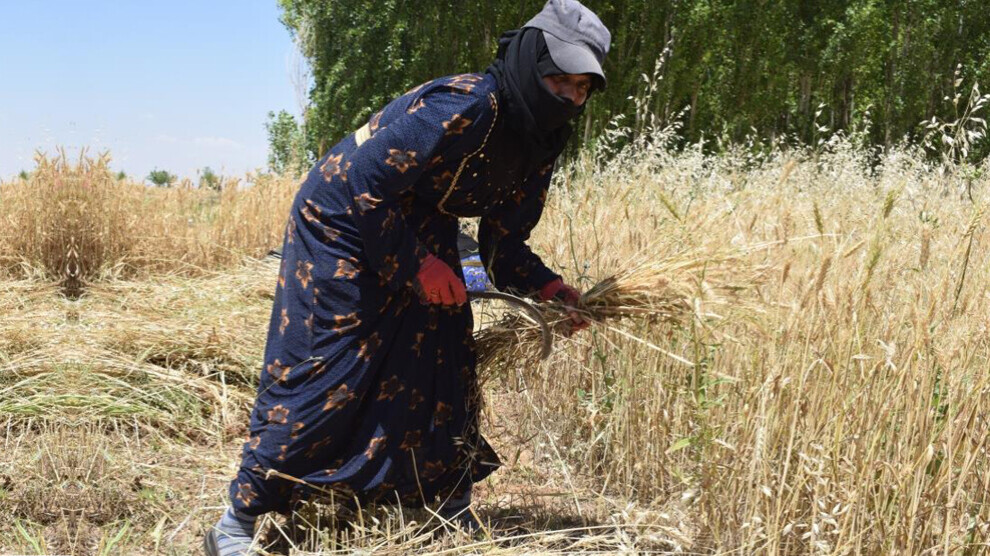They keep working in agriculture despite great challenges
Women fill many roles in agriculture because they are the only ones who can work in hard and challenging working conditions, which include working in the heat, and even on frosty days.

SIBILYA EL-IBRAHIM
Manbij- Farmers in northeastern Syria have faced several crises in recent years, including the drop in the water level of Euphrates River, as well as the worst drought that has hit the region in nearly 70 years because of climate change, a lack of rain, and high temperatures.
Despite the decrease of agriculture in Syria's northern and eastern areas, agriculture is still a vital source of food and income for many households, and people have been involved in agriculture by using traditional methods. Despite the invented advanced agricultural means, the women in the region use the traditional methods to harvest crops.
30-year-old Nora Samaan is from Qalaat Najm, a village southeast of Manbij in NE Syria said, "About three months ago, I formed a working group consisting of 29 women to work in agriculture, harvest crops and clean orchards and trees of weeds for the purpose of self-sufficiency because if we do not work, we won't survive.”
"Agriculture mostly depends on women, because women are the ones who do everything in agriculture including growing and harvesting crops while taking care of their children," Nora Samaan said, “The burden of feeding the family falls upon the shoulders of the women so working in agriculture is a part of a rural woman's life, many women water the gardens, lands and orchards on their own and without seeking for help.”
"Right now, we're harvesting wheat and barley with hand machetes, as well as plowing the land around the olive trees, and in the coming days, we'll be work in the orchards, harvest sesame and olives," she said, indicating that the work is done all year, except on frosty days.
"I rely on myself and also help women find jobs and earn a living without being undervalued by the farmers," says Noura Semaan, who formed a women's working group.
"We started working in agriculture approximately three months ago," 44-year-old Zahia Khalaf, said, "We plant olive trees and other trees not to ask help from charities.”
Zahia Khalaf called for the development of specific programs for women to support the economy of women and society. "There is no difference between a man and a woman," she said, adding, "Since self-sufficiency brings economic freedom with it."
They work to meet the needs of their children
"If we don't work, we won't be able to meet the needs of our children,” said Bara'a Al-Othman, a 30-year-old mother of three sons and five daughters. “My husband's income doesn’t meet the needs of our family, so I work to help him, to shoulder the burden of the family.”
"If we do not make efforts, we will not be able to get a livelihood," she said, urging the responsible authorities to develop initiatives for women so that they may work near their children.
She started working in agriculture due to their difficult economic situation
"Because of our difficult economic situation, I chose to work in agriculture. We live in a bad economic situation, which forced me to work in agriculture," said 37-year-old Nabiha Abdul-Jassem (37), her family's breadwinner. "Due to the high living costs, my husband cannot meet the needs of our family alone,” she said, adding that she also bears the burden of housework. “Once I finish my work in the lands, I have a lot of responsibilities at home.”
Mona Ibrahim, 35, said that she started working in agriculture three months ago because their financial situation had worsened because of the rising prices. "We work hard, but if we don’t work hard, we cannot make a living,” she said, complaining about the low wage for their labor.
Speaking about their working group, she said, “We have a working group. We are like a big family. If one of us does not come, we miss her.”
